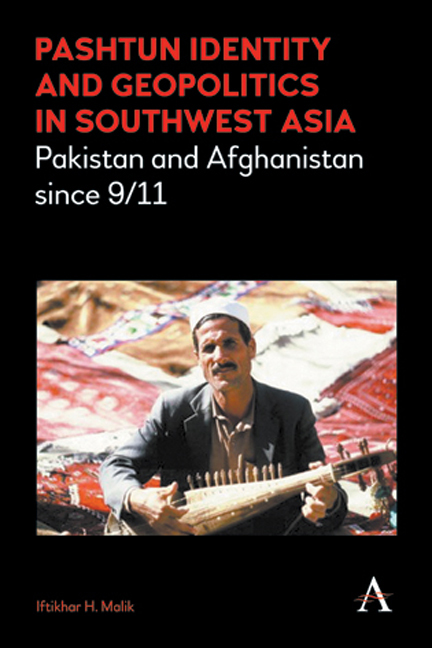Book contents
- Frontmatter
- Contents
- Preface
- Acronyms
- Glossary
- Maps
- Introduction
- Chapter One Gandhara Lands: Wrestling with Pashtun Identity and History
- Chapter Two Imperial Hubris: The Afghan Taliban in Ascendance
- Chapter Three Masculinities in Conflict: Western Pedagogy and the Return of the Afghan Taliban
- Chapter Four Understanding Pakistan: Geopolitical Legacies and Perspectives on Violence
- Chapter Five Understanding Civic Sentiments and Movements in Pakistan: Stalemated Cycle, or a Way Forward?
- Chapter Six The United States and Pakistan: Friends or Foes!
- Chapter Seven The European Union and Southwest Asia: Perceptions, Policies and Permutations
- Conclusion: Pashtun Troubled Lands, Uncertain Southwest Asia or a New Beginning!
- Notes
- Bibliography
- Index
Conclusion: Pashtun Troubled Lands, Uncertain Southwest Asia or a New Beginning!
Published online by Cambridge University Press: 22 July 2017
- Frontmatter
- Contents
- Preface
- Acronyms
- Glossary
- Maps
- Introduction
- Chapter One Gandhara Lands: Wrestling with Pashtun Identity and History
- Chapter Two Imperial Hubris: The Afghan Taliban in Ascendance
- Chapter Three Masculinities in Conflict: Western Pedagogy and the Return of the Afghan Taliban
- Chapter Four Understanding Pakistan: Geopolitical Legacies and Perspectives on Violence
- Chapter Five Understanding Civic Sentiments and Movements in Pakistan: Stalemated Cycle, or a Way Forward?
- Chapter Six The United States and Pakistan: Friends or Foes!
- Chapter Seven The European Union and Southwest Asia: Perceptions, Policies and Permutations
- Conclusion: Pashtun Troubled Lands, Uncertain Southwest Asia or a New Beginning!
- Notes
- Bibliography
- Index
Summary
‘This is not our war, it is a foreigners’ war; it is based on their goals […] America didn't want peace. America should be honest with Afghanistan. What they say and what they do should be the same.’
Hamid Karzai‘I am a United States Army General, and I lost the Global War on Terrorism.’
Lt. General Daniel Bolger‘Who could have imagined at the end of 2001 that 13 years later the US would be exchanging prisoners with the Taliban? For the US, getting back their only prisoner detaches them further from Afghanistan, the handover of the five leaders is a sign of their legitimacy and strength.’
The Independent‘On initial inspection, Afghanistan has little to commend it as a country worth fighting and dying for. Located in one of the most inhospitable and remote corners of the earth it is the world's fifth poorest state and has become synonymous with instability, terrorism and war.’
Colonel Stuart Tootal of the British Army‘Once, getting very excited, President Karzai told me that, if Musharraf did not accede to some particular demand (I forget what), he, Karzai, would personally head Pashtun march on the Attock bridge across the Indus (the jumping-off point for many invasions in the other direction) and lead an attack into the Punjab itself.’
Ambassador Sherard Cowper-ColesBy 2015, most NATO troops had departed from Afghanistan, and like Iraqis and Libyans, Southwest Asians found themselves bequeathed to the violent forces of disarray. September 11 and its postscript spun an entire vortex of armed trajectories which, despite an avowed hostility towards the ‘insidious’ West, has metamorphosed into an unending fratricide with ethnic and sectarian violence as its two taxing manifestations. The Afghan Taliban, by virtue of being predominantly Pashtuns, saw themselves bearing the brunt of the West's longest ever military engagement and thus in a plural society like Afghanistan, one could foresee a greater recourse to ethnic particularism. Hamid Karzai, popular in Western metropolises for some time, failed to win over the Pashtuns in addition to causing a major trust deficit in Islamabad. His lack of clarity and courage on reconciling with the Taliban and instead blaming Pakistan for all his domestic woes eventually was followed by a greater mistrust of his Western backers.
- Type
- Chapter
- Information
- Pashtun Identity and Geopolitics in Southwest Asia , pp. 133 - 150Publisher: Anthem PressPrint publication year: 2016



